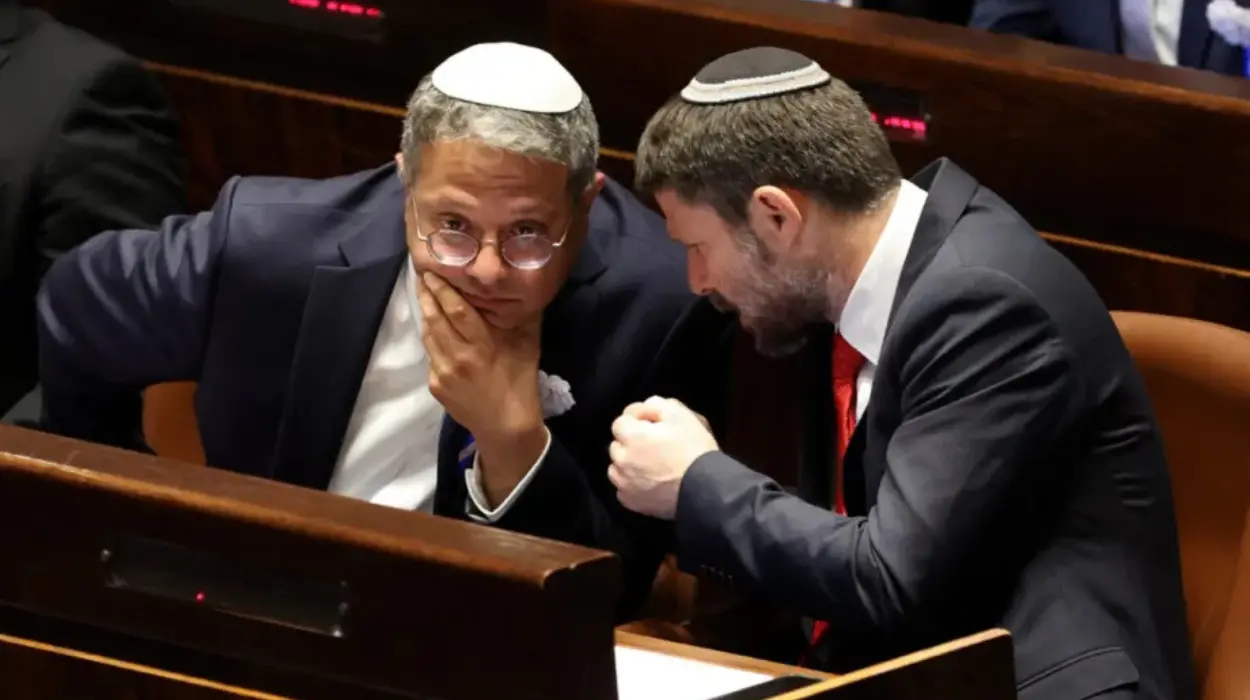The United Kingdom, in coordination with Canada, Australia, New Zealand, and Norway, has imposed targeted sanctions on two far-right Israeli ministers, Itamar Ben-Gvir and Bezalel Smotrich, citing their roles in inciting extremist violence and serious human rights violations against Palestinian communities in the West Bank and Gaza. The sanctions include asset freezes and travel bans on both ministers, marking a significant diplomatic move amid escalating violence in the region.
UK and Allied Sanctions: Details and Rationale
The sanctions announced on June 10, 2025, target Itamar Ben-Gvir, Israel’s National Security Minister, and Bezalel Smotrich, the Finance Minister and Additional Minister of Defence. Both are members of Prime Minister Benjamin Netanyahu’s far-right coalition government and are known for their extremist rhetoric and policies that undermine Palestinian rights.
The measures include freezing any assets the ministers hold within the sanctioning countries and banning their travel to these nations. Importantly, the sanctions apply to the individuals personally, not their official government ministries or departments.
British Foreign Secretary David Lammy emphasized the gravity of the ministers’ actions, stating that Ben-Gvir and Smotrich “have incited extremist violence and serious abuses of Palestinian human rights” and that such conduct is “not acceptable.” He added that the sanctions aim to “hold those responsible to account” and send a clear message against violent and extremist rhetoric.
Joint Statement by Allied Foreign Ministers
The foreign ministers of the UK, Australia, Canada, New Zealand, and Norway issued a joint statement condemning the ministers’ incitement of violence, which has led to deaths and displacement of Palestinian civilians. They highlighted that settler violence is fueled by extremist calls to forcibly displace Palestinians and expand illegal settlements, actions that threaten the viability of a two-state solution.
The statement reaffirmed the coalition’s commitment to a two-state solution as the only sustainable path to peace and security for both Israelis and Palestinians. It also called on the Israeli government to uphold its obligations under international law by taking meaningful steps to end extremist rhetoric and settler violence.
Background: Ministers’ Extremist Positions and Actions
Itamar Ben-Gvir leads the Jewish Power party and has a history of advocating for the removal of Palestinians from their lands, including controversial calls to replace the al-Aqsa mosque with a synagogue. Bezalel Smotrich, head of the National Religious Party-Religious Zionism, has openly supported the expansion of illegal settlements in the West Bank and has called for a complete blockade of aid to Gaza, even suggesting the destruction of the territory and the forced relocation of its population.
These positions have exacerbated tensions in the occupied territories, contributing to an increase in settler violence. Reports indicate that 2024 saw the worst settler violence against Palestinians in two decades, with 59 illegal outposts established that year alone, far surpassing the annual average of seven between 1996 and 2023. In 2025, the trend continues, with the Israeli government recently announcing 22 new settlements in the West Bank.
Reactions from Israel and International Community
Israeli Government Response
Israel’s Foreign Minister Gideon Saar condemned the sanctions as “outrageous” and announced plans for a special government meeting to discuss the response. Bezalel Smotrich expressed contempt for the UK’s actions during the inauguration of a new unauthorized settlement in Hebron, declaring that Britain’s previous attempts to block settlement efforts had failed and vowing to continue building.
Itamar Ben-Gvir responded defiantly, mocking UK Prime Minister Keir Starmer by saying, “We survived Pharaoh, we will survive Keir Starmer as well,” underscoring his rejection of the sanctions.
International Diplomatic Context
The sanctions come amid growing international concern over the humanitarian crisis in Gaza and the West Bank. The UK and other European nations have intensified calls for Israel to lift the blockade on Gaza to prevent famine and allow humanitarian aid to reach civilians. Last month, the UK suspended free trade negotiations with Israel, citing “egregious” policies in the occupied territories, summoned its ambassador for consultations, and announced additional sanctions targeting Israeli settlers.
British officials have described recent Israeli military actions as a “dark new phase” in the conflict and condemned Smotrich’s remarks advocating for the destruction of Gaza and forced displacement of Palestinians as “dangerous” and “repellent”.
Implications for Israeli-Palestinian Relations and UK-Israel Ties
The sanctions highlight a growing rift between Western allies and the Israeli government’s far-right elements. While the UK and its partners reaffirm their support for Israel’s security and condemn terror attacks by groups like Hamas, they are taking a firm stance against Israeli officials whose rhetoric and actions undermine peace efforts and violate human rights.
The move signals a willingness by the UK and allied nations to hold individual political figures accountable for incitement and violence, rather than limiting diplomatic pressure to the Israeli state alone. This could set a precedent for further targeted sanctions if extremist settler violence and settlement expansion continue unchecked.
The UK-led sanctions against Itamar Ben-Gvir and Bezalel Smotrich represent a coordinated international effort to confront extremist elements within the Israeli government responsible for inciting violence against Palestinians. With asset freezes and travel bans now in place, the UK and its allies are sending a clear message that such conduct will not be tolerated and that the path to peace requires respect for human rights and adherence to international law.
As tensions persist in Gaza and the West Bank, the international community’s focus remains on preventing further humanitarian catastrophe, ensuring aid access, and reviving prospects for a two-state solution that guarantees security and dignity for both Israelis and Palestinians.









